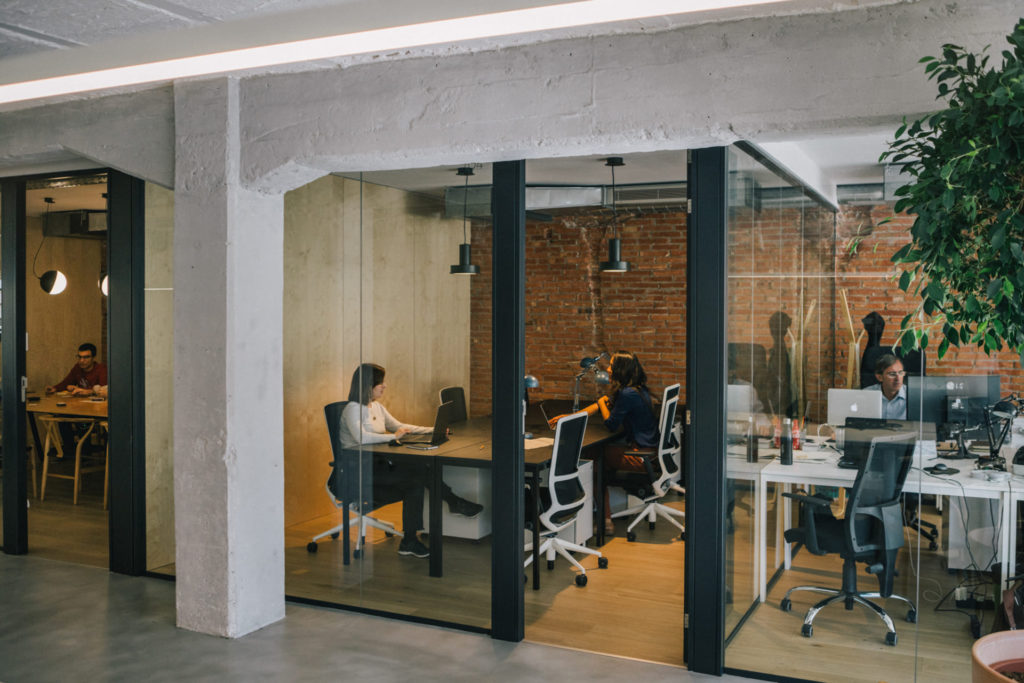
Learning
What are the flexible workspaces? All you need to know
August 12 / 2020
Find out what are flexible workspaces, and discover several types and advantages. Check how your ideal workspace is.
As the working world evolves and changes to adapt to the new normal, the concept of the flexible workspace is becoming more relevant. But what are flexible workspaces? One of the vital expenses of any company is the cost of office space.
Companies traditionally purchased, rented or leased office space as per their needs and the size of their company. But problems would occur depending on the different needs of the company from year to year. If the business prospered and grew, the problems of adapting the workspace to fit the company size became a major headache.
A company could be situated in an ideal location for business, but as the business expanded, the problem of finding office space of adequate size would present itself. To get a space of the right size might mean shifting location, which could have a detrimental effect on the business. However, the concept of flexible workspaces seems to present an ideal solution to the problem. We are going to explain it to you in Cloudworks.
What Must a Flexible Workspace Have?
A flexible workspace is a workspace that adapts easily to accommodate extra people to work, either permanently or temporarily and at short notice. It should be well-lit, with ergonomically-comfortable and adaptable furniture.
It should have access to the Internet with adequate plug and ethernet points. It should be designed in a simple yet pleasing manner, in a way that doesn’t dominate. The design must blend into the background so that high-productivity work can take place.
Types of Flexible Offices
The office of today comes in a variety of forms. There may be separate cubicles so that everyone can get on with the work to which they are assigned. However, today, cubicles may have lower walls and easy mobility for work collaboration, brain-storming and meetings. One expensive part of traditional office space was the board room or meeting room.
This was a spacious room set up for official meetings, that could go empty for days until an official meeting was called. With today’s flexible concept, the meeting room is still a feature of today’s office space.
But on the days it’s not hosting meetings it can host hired freelancers and consultants. In other words, when extra office space is required the company can avail of the extra space the meeting room affords. Yet, thanks to flexible furniture and thoughtful design, it can revert to being the meeting room when required. There are different models of flexibility in offices to suit different kinds of office needs.
Coworking Space
Coworking space is a concept in which workers from several different companies (or perhaps even some freelancers) share office space. This is more cost-effective than everyone renting separate offices. The company giving the space on rent to the companies renting the space can make some facilities available, such as the reception desk, refreshment facilities and parcel reception services.
Not only does it save on expenses, it prevents workers from feeling isolated from the rest of the world as they work alone at their tasks. Renting coworking space makes it easier for companies with a smaller budget to cost-effectively run their business.
Hot Desks
The concept of hot desks refers to a system of office rotation where different employees share the same desk for certain tasks, using the desk at pre-determined times. Obviously, the desk is used by one employee at a time. In cities where space is highly expensive, this system can work out to be cost-effective.
Studies have shown that there are disadvantages as well as advantages to this system. It seems to work best where there are different shifts in a day and the employees concerned are not in the office at the same time.
Open Offices
The concept of open offices, or open-plan offices, refers to a type of office space where employees of a particular company share large office space as opposed to sitting alone in isolated cubicles. The primary reason for this appears to be cost-effectiveness and flexibility. More workers can be absorbed into a common office space than can be accommodated where everyone has a space of their own.
This also makes it easier for workers to communicate with each other. Impromptu meetings and brain-storming sessions can be easily organised. Also, it is considered to better for the workers to feel part of a bigger organisation than they would feel if they were sitting alone to do their work. It’s an ideal set-up for workers who need to constantly collaborate.

Advantages of a Flexible Workspace
There are certain advantages to the concept of flexibility in the area of office space. Let’s take a look at some of them.
– Cost-Effectiveness: It can be more cost-effective for smaller businesses to rent shared office space than to rent an exclusive space. Freelancers who can’t work at home for some reason may also enjoy this advantage. For companies that create their own flexible spaces, there are great rewards. New workers can be more easily absorbed into a flexible set-up.
– Ease of Accommodation and Collaboration: Office spaces with flexibility can easily accommodate temporary help or new employees. It is also easier to set up meetings and for team members to collaborate effectively with each other.
– Improved Productivity: Productivity is much better when morale is high and the morale of people who work in a shared space is generally higher than that of those who work in isolation.
How to Create a Flexible Workspace?
To convert a traditional office space a high-productivity workspace with the required flexibility isn’t cheap, but the advantages are such that it pays for itself in the long run. Or you might prefer to rent workspace from a company that specialises in providing this space. Many companies find the second option suits them best. Consider all your options to make the right decision.
Your Ideal Workspace with Cloudworks
Are you a freelancer or a small business owner based in Barcelona or Madrid? Do you find yourself or your company in need of coworking space? Or perhaps you would prefer a private office space with full flexibility? Do you have a meeting or an event coming up for which you need appropriate space?
Search no more. Cloudworks is the best choice for a flexible workspace that supplies all your needs. We have properties in prime city locations and we have a range of support that covers anything you may require. Most importantly in this time of the global pandemic, we guarantee workspaces and spaces with all the precautions in place to safeguard your health and the health of your workers or guests.
So get in touch today and tell us how we can help you to bring flexibility to your company. Whether you’re in Barcelona or Madrid, in Cloudworks we can offer you the most inspiring and flexible spaces available to increase productivity and support you and your workforce to be the best and most productive that it can be.
